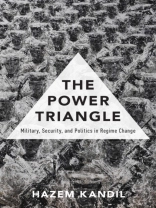Revolution, reform, and resilience comprise the respective fortunes of modern Iran, Turkey, and Egypt. Although the countries all experienced coups with remarkably similar ambitions, each followed a very different trajectory. Iran became an absolutist monarchy that was overthrown from below, Turkey evolved into a limited democracy, and Egypt turned into a police state. In The Power Triangle, Hazem Kandil attributes the different outcomes to the power struggle between the political, military, and security institutions. Coups establish a division of labor, with one group of officers running government, another overseeing the military, and a third handling security. But their interests begin to vary as each group identifies with its own institution. Politicians wish to rule indefinitely; military officers prefer to return to barracks after implementing the needed reforms; and security men scramble to maintain the privileges they acquired in the post-coup emergency. Driven by conflicting agendas, these partners in domination struggle over regime control. Using comparative historical sociology, Kandil demonstrates how regimes are constantly shaped and reshaped through the recurrent clashes and shifting alliances between the team of rivals in this "power triangle."The Power Triangle’s realist approach to regime change shows that a clear explanation of pivotal events in Iran, Turkey, and Egypt is impossible without a firm grasp of the power relations within each country’s ruling bloc.
Hazem Kandil
Power Triangle [PDF ebook]
Military, Security, and Politics in Regime Change
Power Triangle [PDF ebook]
Military, Security, and Politics in Regime Change
Mua cuốn sách điện tử này và nhận thêm 1 cuốn MIỄN PHÍ!
Ngôn ngữ Anh ● định dạng PDF ● Trang 336 ● ISBN 9780190239213 ● Nhà xuất bản Oxford University Press ● Được phát hành 2016 ● Có thể tải xuống 3 lần ● Tiền tệ EUR ● TÔI 5278874 ● Sao chép bảo vệ Adobe DRM
Yêu cầu trình đọc ebook có khả năng DRM












